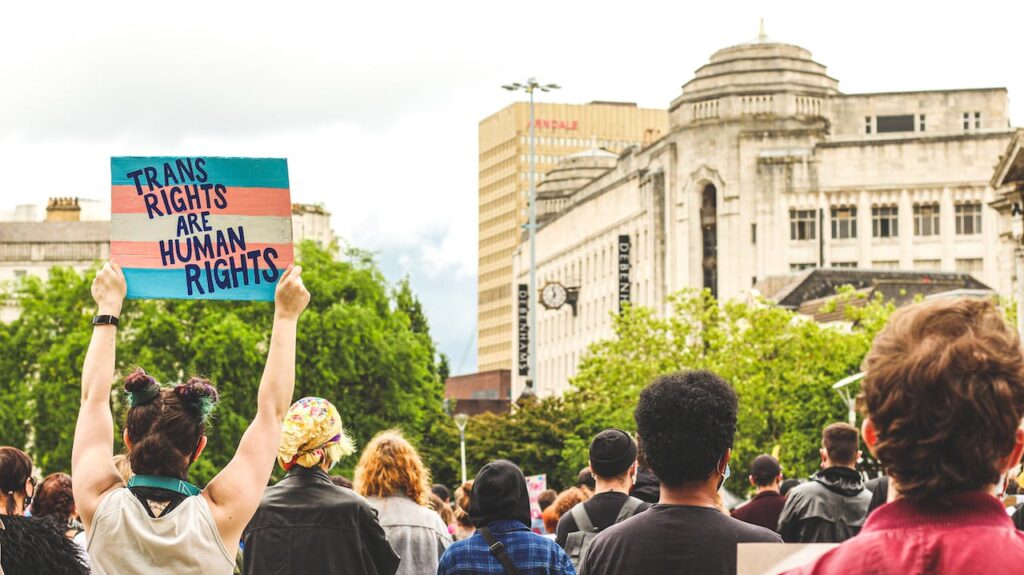Trans pride – a march apart?

Trans people have doubtless existed for all of human history, and the surgical advances needed for people to transition came about in the mid-twentieth century, so it might seem strange to some that trans people are still feared and vilified today. The first person to undergo gender reassignment surgery in the UK was Roberta Cowell all the way back in 1951. Happily married former racing driver and Second World War Spitfire pilot Bob Cowell had two children before transitioning gender to become Betty Cowell. His wife was unable to handle the news that her husband identified as a woman and planned to undergo gender reassignment surgery, severing all contact and taking their children away to grow up with no further contact with or knowledge of their missing father. While Betty went on to live a rich and full life, her former wife reclused and died alone.
Trans people had to wait until 2004 before the Gender Recognition Act finally allowed them to legally change their gender and change all their legal documentation without requiring them to undergo surgery or hormone treatment. A consultation completed in 2020 on the GRA supported the removal of medical requirements but failed to remove the main barriers that prevent people from legally transitioning in the UK. Someone who identifies as trans has first to find a specialist able to diagnose them with gender dysphoria, despite this no longer being a recognised psychiatric condition, and to wait for two years as their affirmed gender before their case is evaluated by a committee of legal and medical professionals. Invasive, costly, difficult and slow – these combined measures continue to make it unnecessarily difficult for trans people to achieve recognition of their identities.
Trans lives matter
Victor Madrigal-Borloz, UN Independent Expert on Sexual Orientation and Gender Identity, recognised in May 2023 that there was a “rising rhetoric on trans rights in the UK” that was having a “toxic” effect on people and institutions, while “LGBTI+ people across the UK are still waiting for a promised but undelivered end to harmful ‘conversion’ practices”. He warned that “anti-trans rights rhetoric is steadily becoming another wedge issue in the UK that is undermining human rights. We are witnessing the UK backsliding on LGBTIA+ rights, where we used to be proud in our world leadership.”

Weapons of mass disinformation
The main weapon being used against trans people is disinformation.
Contrary to popular belief, the Government has concluded there is no evidence that trans women are secretly predatory men in disguise or that trans women using female toilets pose a threat to other women, but there is much evidence that trans women are at risk who are forced to use male bathrooms.
Nor are children being encouraged to take drugs that will irreversibly change their biological development. GPs have simply been offering those who are convinced that they are trans puberty blockers. These drugs were introduced all the way back in the 1960s and are held to be entirely safe, merely delaying the onset of puberty in an entirely reversible manner to give children a chance to mature and decide with which gender they identify without the ticking clock of their changing hormones driving them down the path to a gender they might afterwards decide is a path with which they no longer identify. The Gender GP explains more for those who are interested.
Vox goes on to explode more popular myths about trans people in this blog post.
You can find answers to just about any question you might have wanted to ask about trans people here on the Stonewall webpage, “the truth about trans”.
Never let facts get in the way of a good lynching
With violence against trans people hitting record levels in late 2023, it is unsurprising that trans people, on average, experience much worse mental health than the general population, with around half having seriously contemplated ending their own lives, driven beyond endurance by hostility and isolation. Healthcare is also failing trans people. Quite apart from the average 26-year wait for a first appointment at London’s NHS gender clinic, standard health checks are often missed for trans people, such as screening for cervical cancer and asking routine health questions about the possibility of pregnancy before surgery in trans men.
Enter the responsible bystander
We all have a responsibility to arm ourselves with the facts and to challenge ignorance when we hear it, if only because how we treat the most marginalised people in our society sets the standards by which we may all expect to be treated in time. We should take care of the most vulnerable among us, even if only for our own sake.
You don’t have to do anything you don’t feel comfortable doing and you certainly should not put yourself in danger. You can learn more about being an active bystander by becoming an UPSU Speak out, step up champion.
In general, when you hear something you know is wrong, gently questioning or challenging the belief is vital. Still, it pays to be a tactful bystander. Correct the facts, not the person’s view. If they are amenable to reason, they will change their view when they understand the facts. If not, then it is unlikely they can be swayed by reason. There may be some aspect of themselves that frightens them or they may worry on some level that social change may come to adversely affect them in time. It is important in such cases to let people express their fears and help them recognise that behind their anger and indignation, it is fear that motivates them but that the existence of a minority is not the cause of that fear – the fear has been instilled in them by others to manipulate them.

References
Amnesty International. (2023, May 11). UK: UN view on trans rights is ‘much-needed common sense’ [Press release]. https://www.amnesty.org.uk/press-releases/uk-un-view-trans-rights-much-needed-common-sense
All About Law. (2018, November 12). The history of transgender rights in the UK. https://www.allaboutlaw.co.uk/commercial-awareness/legal-spotlight/the-history-of-transgender-rights-in-the-uk-




Leave a Comment (note: all comments are moderated)